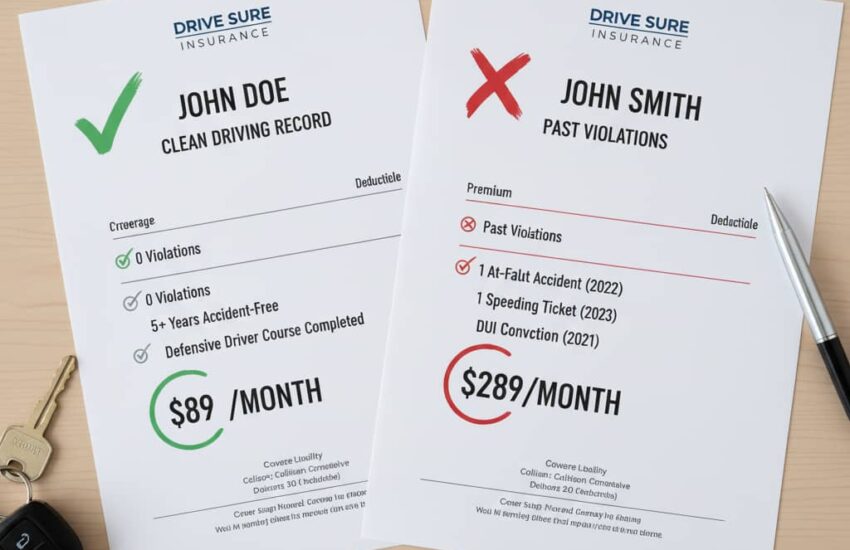Your driving history reveals more than just your skills behind the wheel; it can significantly impact your life insurance costs. Learn how insurers evaluate risk and strategies to keep your premiums affordable. The moment my life insurance application asked for my driver’s license number, I felt a familiar pang of anxiety. That single fender-bender from three years ago, the one I’d almost forgotten, suddenly felt monumentally important. As it turned out, the insurer not only knew about the accident but had already accessed my complete motor vehicle record before our interview. This experience revealed what many don’t realize: life insurance companies view your driving history as a window into your overall risk profile, and the view through that window can either save you money or cost you significantly.
Driving records matter to life insurers because they provide tangible evidence of behavioral patterns. Statistical data consistently show that poor driving habits correlate with shorter lifespans, not just from automotive accidents but from broader risk-taking behaviors. According to industry studies, individuals with multiple moving violations are significantly more likely to file premature death claims. This isn’t merely about impaired driving; it’s about what your choices behind the wheel suggest about your decision-making in other aspects of life.
The severity and recency of violations create a sliding scale of premium impacts. A single speeding ticket from two years ago might not affect your rates at all, while a recent DUI could increase premiums dramatically or even lead to outright denial. Insurance underwriters typically review the past three to five years of driving history, with recent violations carrying greater weight than older infractions. The most concerning violations include driving under the influence, reckless driving, excessive speeding, typically twenty or more miles over the limit, hit-and-run incidents, and driving with a suspended license.
The frequency of violations matters as much as the type. Several minor speeding tickets within a twelve-month period signal a pattern of behavior that worries insurers more than one major violation followed by years of clean driving. I worked with a client who had a single reckless driving charge from four years prior, but had maintained a perfect record since then. The insurer offered standard rates after verifying his subsequent clean history.
Age significantly impacts how driving records are evaluated. For younger drivers, even minor violations can significantly impact premiums because insurers already consider this demographic high-risk. Middle-aged drivers with clean records might see no impact from a single breach, while seniors with moving violations might face increased scrutiny due to concerns about declining faculties.
The type of life insurance policy affects how heavily driving history weighs in underwriting. Simplified issue policies with no medical exam often place a greater emphasis on motor vehicle records, as they have fewer data points to assess risk. Fully underwritten policies consider driving history alongside comprehensive medical and lifestyle information, sometimes mitigating the impact of minor violations.
Geographic location plays an unexpected role. Some states share driving records more readily than others, and insurers adjust their evaluation based on regional driving patterns. What constitutes a serious violation varies by state law, and insurers take these differences into account when reviewing applications.

Improving your driving record directly improves your insurability. Most violations lose their impact after three years, with major violations fading after five to seven years. I advise clients to contest questionable violations to keep them off their record, complete defensive driving courses to demonstrate improvement, and maintain clean driving for at least two years before applying for insurance.
The availability of usage-based insurance programs creates new opportunities for drivers to prove their safety. Telematics devices that monitor driving habits can provide concrete evidence of improved behavior. However, most life insurers do not yet incorporate this data directly into their systems. However, demonstrating responsible driving through these programs can support appeals if you receive a rated policy.
Shopping among insurers is crucial after violations. Companies weigh driving records differently; some automatically decline applicants with DUIs within five years, while others specialize in high-risk drivers with slightly higher premiums. An independent broker can match your specific history with insurers known for more favorable underwriting of driving issues.
The connection between driving and lifestyle often extends beyond the road. Insurers recognize that responsible drivers tend to exhibit more cautious behaviors in other areas—they are more likely to wear seatbelts, follow medical advice, and avoid dangerous activities. This correlation makes your driving record one of the most powerful non-medical factors in risk assessment.
Appealing decisions based on driving records require documentation. If you receive a higher premium due to violations, provide evidence of completed driving courses, proof of consistent commuting patterns, or letters from employers regarding safe driving requirements. One client reduced her premium increase by providing documentation showing her violation occurred during an emergency medical situation.
Ultimately, your driving record tells a story about responsibility, judgment, and respect for safety, the same qualities that interest life insurers. A clean record demonstrates a pattern of behavior that suggests a potential for a longer lifespan, while violations suggest an increased risk. The good news is that, unlike age or genetics, your driving behavior remains within your control, giving you direct power to improve both your safety on the road and your insurance rates.
References
LDB Insurance. (2022, August 21). How a traffic ticket can affect your life insurance. https://www.ldbinsurance.com/how-a-traffic-ticket-can-affect-your-life-insurance/
Policygenius. (2024, May 30). Motor vehicle reports (MVR) and life insurance rates. https://www.policygenius.com/life-insurance/how-your-motor-vehicle-report-mvr-affects-your-life-insurance-rates/
eFinancial. (2024, June 5). How your driving record affects life insurance rates. https://www.efinancial.com/resources/blogs/blogpost/driving-record-and-life-insurance-rates/
Quotacy. (n.d.). How your driving record affects your life insurance. https://www.quotacy.com/how-your-driving-record-affects-your-life-insurance/
Investopedia. (2025, February 20). 7 factors that affect your life insurance premium. https://www.investopedia.com/articles/investing/102914/7-factors-affect-your-life-insurance-quote.asp

